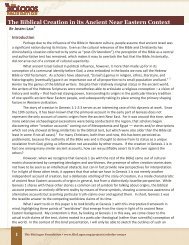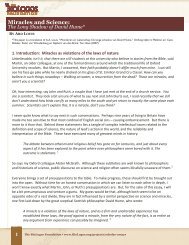What Scientists Do In this scholarly essay, Steve Benner - BioLogos
What Scientists Do In this scholarly essay, Steve Benner - BioLogos
What Scientists Do In this scholarly essay, Steve Benner - BioLogos
You also want an ePaper? Increase the reach of your titles
YUMPU automatically turns print PDFs into web optimized ePapers that Google loves.
The <strong>BioLogos</strong> Foundation • www.<strong>BioLogos</strong>.org/projects/scholar-<strong>essay</strong>s<br />
Nor is <strong>this</strong> perspective on science often on<br />
display in the popular press. When scientists appear<br />
in the news, they are generally sought for their<br />
advice on a matter of public policy. They are asked<br />
for certainty, not to express the uncertainty that is at<br />
the core of science correctly done.<br />
Accordingly, the public routinely sees<br />
scientists as advocates. The supermarket checkout<br />
magazines have scientists in white lab coats<br />
announcing a new cure for cancer. Should we brush<br />
our teeth up and down, or side to side, or in circles<br />
Chances are that someone in a white lab coat has<br />
told us to do each of these at some point in our lives.<br />
When President Obama appears on television with<br />
doctors to support health care reform, his staff has the doctors remove their jackets and don white lab<br />
coats. When I first blogged on <strong>this</strong> site, a principal complaint by intelligent design supporters was that the<br />
scientists that they saw were no less advocates than they were.<br />
There is no mystery as to why non-scientist co-opt readily recognized symbols of science. Biology,<br />
physics, and chemistry have been empowering in society. Every politician, advertiser, or lawyer wants to<br />
have the respect offered to scientists to apply as well to the politics, product, or client that they are<br />
advocating. Creation science, Scientology, even social science, the names were chosen to appropriate the<br />
mantle of respect that out culture gives to science. It is no accident that Mary Baker Eddy founded the<br />
"Church of Christ, Scientist" in 1879, just as our culture was beginning to give science <strong>this</strong> privileged<br />
position of respect.<br />
This provides another reason why it is easy to be confused about what science is and what scientists<br />
do. The imagery of science and scientists is widely expropriated in the public square by non-scientists.<br />
The temptation to participate in the public dialogue as an advocate is considerable. I myself have been<br />
interviewed by reporters who become impatient if I actually practice science before their eyes. It is<br />
generally simpler to give an answer rather than to present the context, including all of its uncertainty.<br />
For <strong>this</strong> reason, it is important, here and elsewhere, for scientists to emphasize that uncertainty is<br />
central to science, and advocacy is disruptive of it. When a scientist becomes an advocate, he loses for<br />
himself the power to use scientific discipline to discern reality.<br />
So how do things ever get settled in science, at least to the point where personal action or public<br />
policy can be based on it As I described in my book Life, the Universe, and the Scientific Method, science<br />
proceeds through the successive movement of the burden of proof from one side of propositions to the<br />
other as each side meets the culturally accepted standard of proof. That standard is met when a<br />
preponderance of evidence favoring one view over another is assembled to the point where it satisfies a<br />
community of interested people.<br />
<strong>In</strong> law, the standard-of-proof is defined by statute. Proof "beyond a reasonable doubt" is required<br />
to convict individuals of a felony (O. J. Simpson was not convicted in criminal court under <strong>this</strong> standard).<br />
"Preponderance of evidence" is the standard-of-proof used in a civil court (O. J. Simpson lost his civil case<br />
to the Brown and Goldman families under <strong>this</strong> standard).<br />
9<br />
<strong>What</strong> <strong>Scientists</strong> <strong>Do</strong><br />
BY STEVEN BENNER




